There are lots of ways that a brand in North America or Europe can address the global plastic waste crisis… but by supporting a project elsewhere in the world? Can financing a project actually lead to quantifiable reductions in plastic pollution?
Well… the short answer is, yes. Here’s a brief introduction to how rePurpose Global connects finance from brands to verifiable action where it’s most needed, and how this leads to plastic waste recovery, socio-economic improvements, and environmental benefits.
How Plastic Recovery Programs Work
Brands that partner with rePurpose Global on Verified Plastic Recovery are voluntarily giving funds - that could otherwise have been profit - to fight plastic pollution and support social initiatives where it is needed the most. Whether this is tied to sales, revenue, or the number of likes in a social media campaign, the funding is used to bridge gaps in waste value chains.
For example, some of rePurpose Global’s projects provide the financial incentives for the collection of low-value plastics: plastics that would otherwise have been left uncollected. Others pay for the sorting and transportation of plastic types to allow them to be recycled, when otherwise this would have been unprofitable and the waste just got dumped or burned.
By funding these activities, brands have a direct environmental impact. It is possible to measure how much plastic has been collected and recovered thanks to the brand’s contribution – i.e. how much plastic pollution has been avoided.
Though Verified Plastic Recovery (VPR) is largely about environmental impact, as you might have read in our previous article, there’s a strong social component to this work. Brands funding VPR are cleaning up communities, and are also responsible for supporting job opportunities, safer working conditions, and uplifting marginalized waste workers.
The different ways that brands can partner with rePurpose Global to fund VPR are :
- Plastic recovery pledge program : Brands commit to contributing revenue-based payments towards global projects preventing plastic pollution and uplifting communities.
- Measurement & recovery : Brands assess their plastic footprint, fund its recovery, and receive verified data on their impact, while also receiving support for reduction strategies.
- Other bespoke claims : Tailored solutions where brands can engage with initiatives such as recovering plastic for every product sold or tying recovery efforts to social media engagement.
Read more about our Plastic Waste Recovery Programs for Brands.
How does the Plastic Recovery Pledge Program work?
- A business chooses an impact project to contribute towards. rePurpose Global has projects around the world that prevent plastic pollution and support local communities.
- Revenue-based payments are agreed to fund direct action. The amount required to be a part of the program depends on the business revenue, number of SKUs or sub-brands associated with action etc. rePurpose Global aims to make impact accessible to brands of all sizes, so there are options for all brands - right from start-ups to big multinational organizations.
- Businesses start to receive data on plastic waste recovery impact, as well as rePurpose Global communication tools andongoing account management support. The set-up process usually takes no more than a few weeks, and impact starts right away. Impact data follows shortly afterwards - usually in the next monthly cycle.
That’s it. It’s pretty simple.
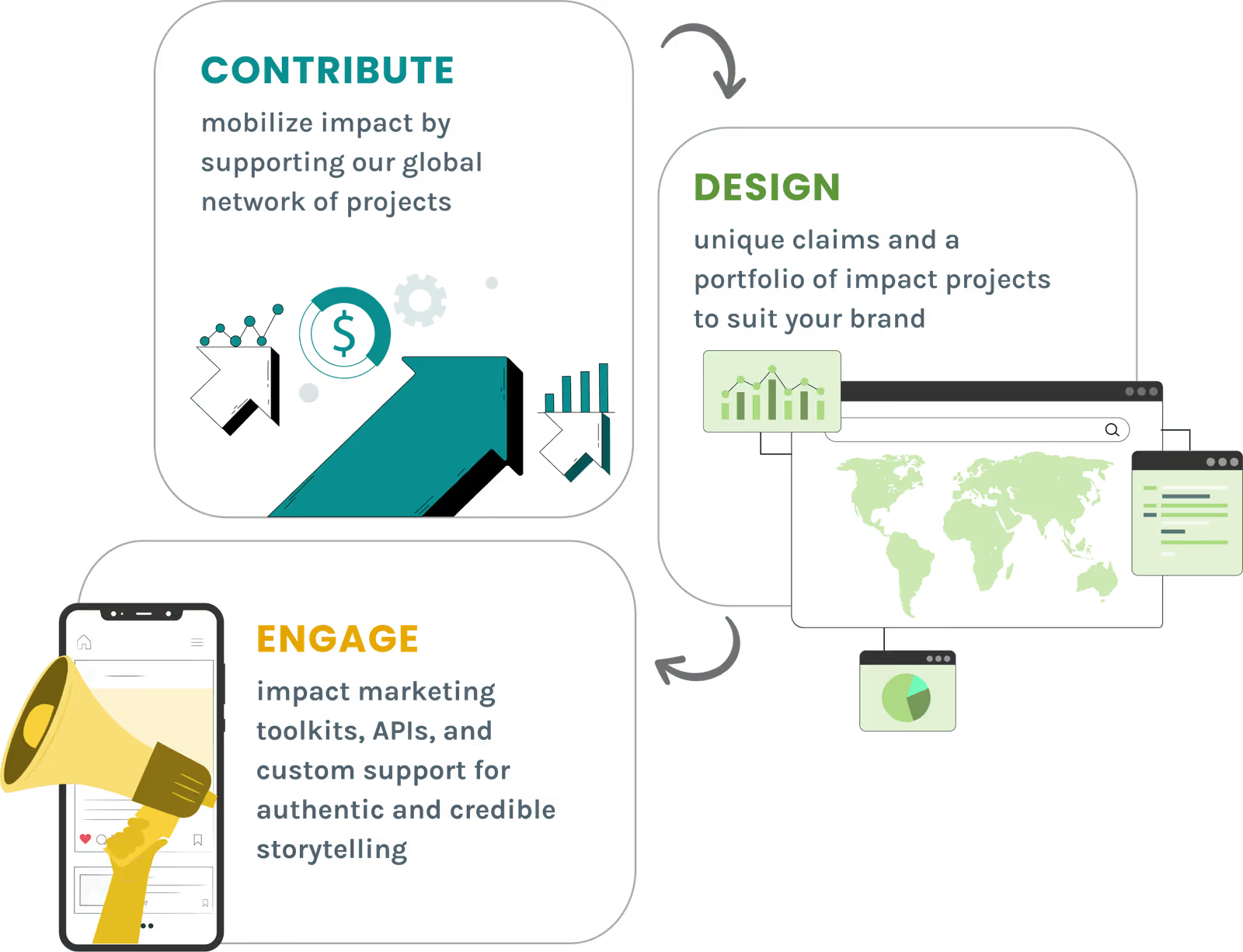
For all of the reasons you’ve already read, the Plastic Recovery Pledge Program is an important, meaningful, and powerful sustainability action.
For brands, it’s also an opportunity to engage with customers. For a start, there’s the unique impact data, available through the rePupose Global impact dashboard, that is audited and verified and can plug directly into communications and sustainability reporting.
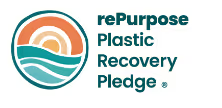
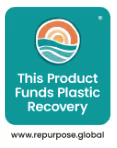
There’s the rePurpose Global certification marks available that can be displayed on product(s) and in communications materials – helping customers make more informed decisions, and helping brands to stand out thanks to their action.
There’s also access to rePurpose Global’s communication and storytelling resources, which include various communication templates, as well as an updated library of images and videos from the impact project that the brand is funding.
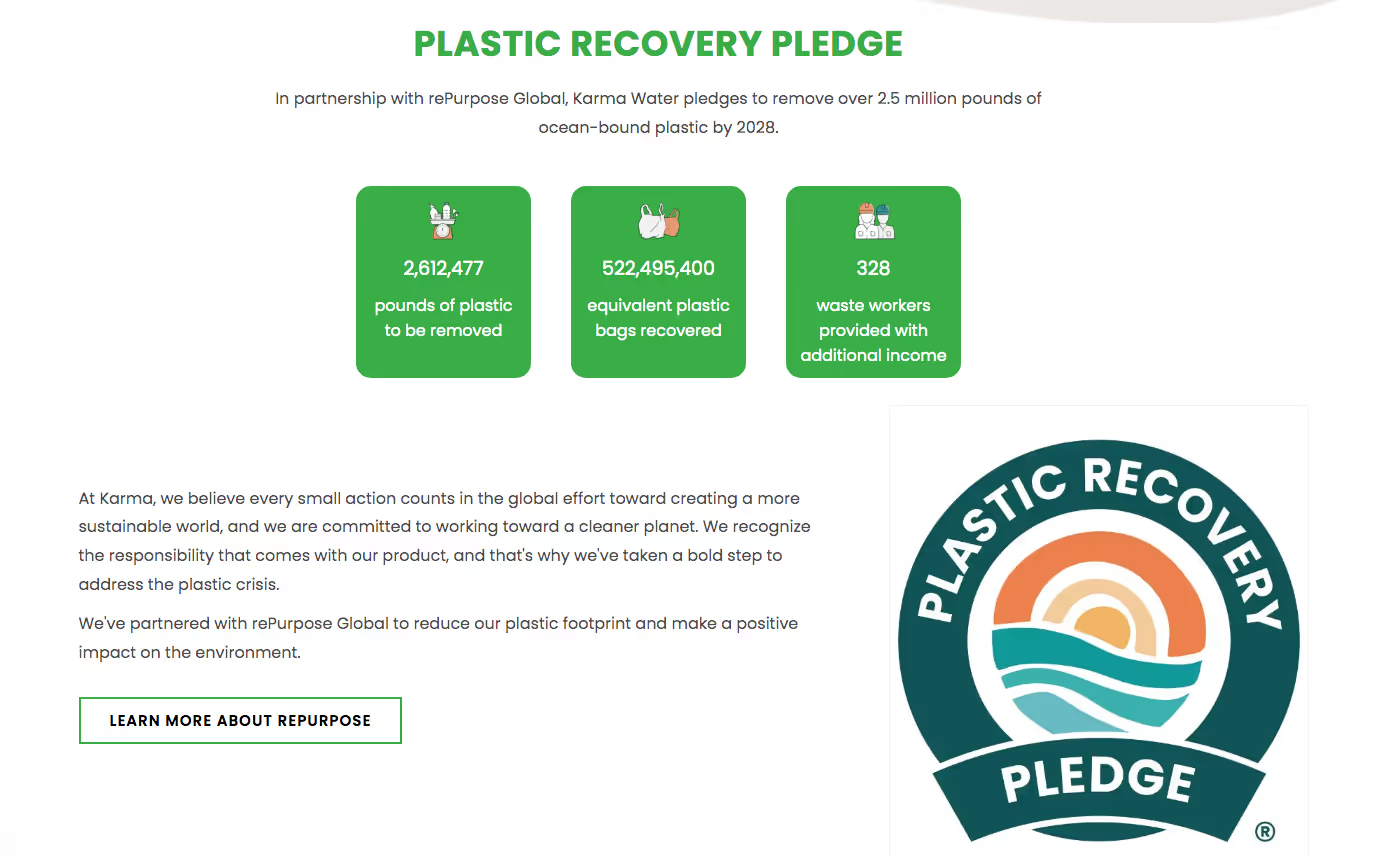
Karma Water is a brand that is part of the program:
"Partnering with rePurpose Global is a pivotal step in Karma Water's journey to help solve plastic waste. Our pledge aligns with our mission to create a cleaner planet and working with rePurpose Global ensures we can have a verifiable impact," said CJ Rapp, Co-Founder and CEO of Karma Water.
There are lots of alternative ways for brands to support VPR.
Measurement and recovery is still a VPR contribution and goes towards the same cause and same projects: brands fund the collection and recovery of plastic waste.
The first step for a brand is the same: selecting an impact portfolio - i.e. choosing a project or mission to support.
The difference is that rePurpose Global’s comprehensive ‘plastic footprint measurement’ tools are used to quickly and accurately calculate the plastic use of products and packaging. Rather than calculating a contribution based on revenue - plastic intensity combined with sales data is used as the basis for the quantity of plastic recovery.
Having analyzed plastic use, brands are provided with insights that can support their reduction strategies. In fact, rePurpose Global works with companies to review or create reduction strategies. We support brands to figure out a realistic, data-driven pathway to reduce plastic use and track progress. Funding plastic recovery without efforts to reduce plastic use means only addressing part of the issue, and it means a plastic action strategy is incomplete.
With measurement completed and reduction strategies in place, brands receive verified data to confirm the plastic recovery. Projects and data are audited by independent third parties twice per year so this data can be confidently communicated.
As with the Plastic Recovery Pledge Program there’s data and project information that can be used in marketing, communications, and ESG reporting. Certifications and communication toolkits are also available to help brands to make credible and trusted claims about action.
On top of rePurpose Global’s standard certifications, following this ‘measure and recover’ the ‘Plastic Neutral’ certification is also an option – or ‘Plastic Negative’ for brands that choose to fund the recovery of at least twice as much as they use.
Grove Collaborative is Plastic Neutral
Grove Collaborative, a US-based sustainable marketplace and retailer is Plastic Neutral with rePurpose Global. If a customer receives any plastic in their order, Grove funds the recovery of the same amount of ocean-bound plastic (equivalent, by weight). Since 2020 Grove Collaborative has funded the collectiong of over 15 million pounds of plastic.
"Eliminating single-use plastic from the products we use everyday is critical to a sustainable future, but it is not entirely achievable today… Our focus is on progress, not perfection, and we are empowering customers to make an impact with every Grove purchase. We are proud of the incredible progress we’ve made with our customers and rePurpose Global.” said Grove Collaborative CEO, Jeff Yurcisin.
But what if a brand loves the idea of action on plastic waste, but none of the existing rePurpose Global plastic recovery models or certifications quite work?
Tailored Plastic Waste Solutions for Brands
rePurpose Global can work with brands to find bespoke solutions. Perhaps recovering a kilogram of nature-bound plastic per product sold, or running a plastic recovery campaign based on social media likes. There’s a world of options to discuss – and the bottom line will always be the creation of transparent, verifiable, and meaningful impact on plastic pollution.
For example, Burt's Bees partnered with rePurpose Global to simply remove ocean-bound plastic waste as part of a bigger Burt’s Bees’ 2025 goal to achieve net zero plastic to nature. The partnership will eliminate over 1.5 million lbs of ocean-bound plastic waste by the end of 2024. Burt’s Bees’ support in India funds recycling facility upgrades and sustained door-to-door waste collection services for around 2,000 households.
Jason Momoa's bottled water brand Mananalu (now part of Boomerang water) aims to provide a more sustainable option for people drinking water ‘on the go’. As well as using recyclable aluminum bottles, Mananalu has a bespoke ‘Drink One, Remove One’ promise at the core of the brand. This means that each bottle of Mananalu water removes the equivalent of 1 ocean-bound plastic bottle from through rePurpose Global’s project Laut Yang Tenang in Java, Indonesia.
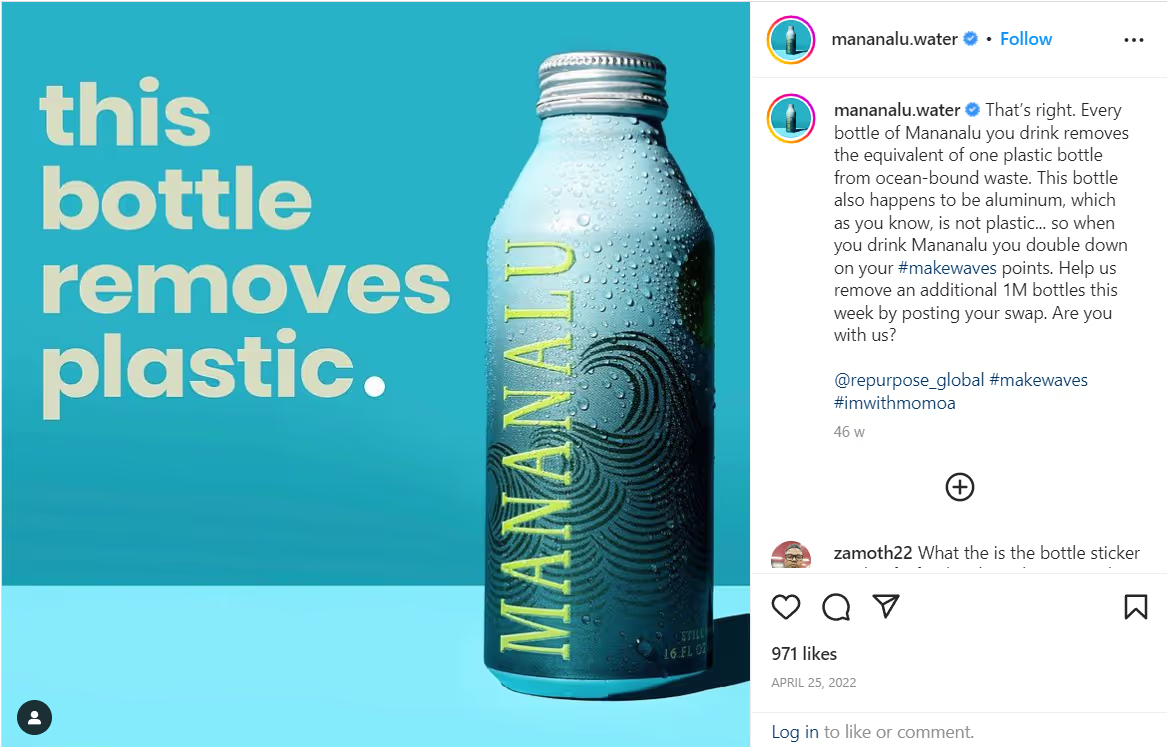

Though the Mananalu product is plastic free (well, almost - aluminum cans contain a very thin layer of plastic that doesn't affect recyclability), they differentiate from other water brands by having an environmental mission to clean-up ocean-bound plastic waste. Their plastic recovery efforts are publicized across channels including their website, social media, and PR such as the launch of Mananalu at Whole Foods Market in March 2023. Customers can even purchase plastic recovery of 100lbs or 200 lbs via the Mananalu shop.
“Single-use plastic is bad for people and the planet. By partnering with rePurpose Global, we don't just offer an alternative, but actively remove plastic from the environment. That's impact. That's change. That’s what we are a part of.” says David Cuthbert, CEO of Mananalu.
That's just a couple of examples. Some other creative options that brands might consider include:
- Impact Guarantee Program - Recovering a specified amount of plastic waste tied to every sale (e.g. 10 lb plastic recovery per product sold)
- Fixed long-term pledge - Creating a multi-year initiative to generate significant impact outcomes and milestones (e.g. 1,000,000 lb over the next 2 years)
- Impact tied to customer action - For example, incentivizing customer referrals, newsletter sign-ups, loyalty programs, or engagement with social media posts with plastic recovery (10 lbs per Instagram follow in April)
- High impact SKUs - Promoting specific SKUs with an impact promise
The impact of VPR goes further than recovering plastic. Like the old mantra about ‘teaching a man to fish’, VPR is not a one-off solution or funding beach clean-ups. Instead, VPR funding goes towards setting up sustainable projects, systems, and infrastructure that will mean plastic waste recovery continues long into the future.
The hope, of course, is that one day, the economy will be circular, and we won’t need to continue developing waste infrastructure in the same way: “waste” will be a thing of the past. We dream of a day where resources stay in circulation and are used again and again. But we can't sit back and wait for that day to arrive. We can’t tolerate the ongoing pollution of our planet. We must stop the leakage of waste into nature.

.avif)
.png)
.avif)
.png)
.avif)






